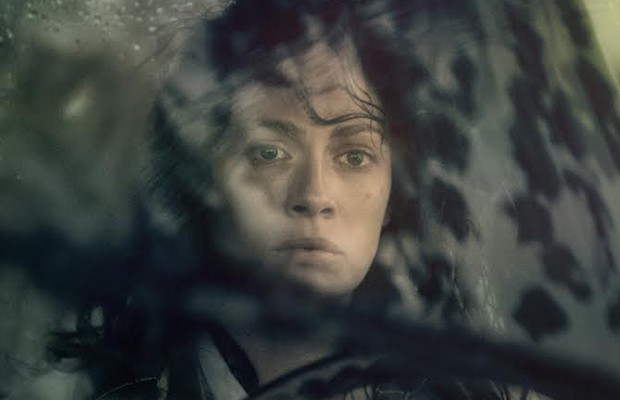Kimberly Levin is an award-winning filmmaker and former biochemist. Her short film Between Baronovsksy premiered at the Seattle International Film Festival and went on to play festivals in the US and internationally. As a theater director, Levin served as Associate Director on the Tony Award-nominated Best New Play Closer. She is also a playwright who has been published alongside Tony Kushner and Craig Lucas. She recently developed a television pilot with Johnny Depp’s company, Infinitum Nihil, set in the coalfields of Appalachia. (Levin’s Kickstarter page)
Runoff will debut at the Los Angeles Film Festival on June 12.
Please give us your description of the film.
Runoff is a slow-burning thriller that we shot in rural Kentucky. This is a place where on the surface there’s a pastoral beauty: it’s harvest time, the kids are getting ready for Halloween. But just beneath is the brutal reality of a farming town. The protagonist, Betty, discovers a crisis threatening her family. Every choice she has leads to somebody getting hurt, and she has to decide whom to sacrifice.
What made you write this story?
The seeds of the story are based on something that happened to me when I was working as a field biochemist in Kentucky. It led me to obsess about this idea that as human beings we make decisions in a temporal way. We have the ability to problem-solve and to judge how our choices will play out over time, which is specific to humans as far as I know. Am I choosing what’s best for right at this moment? Ten minutes or a year from now? Or further in the future? Am I choosing for myself, my family, my neighbors? How wide do I draw the circle around me?
What was the biggest challenge in making the film?
We shot on working farms, so there were many times when the talent was interacting with animals. Our male lead was bitten by a hog in the middle of a scene. We had to figure out how to mike a scene with thousands of squawking turkeys that were pecking through our audio cables. Our lead actress fractured her knuckle while throwing a sack of grain into a pickup truck. We smelled funky (an understatement). We choreographed a series of shots with a biplane that held less than an hour of fuel.
This is my first feature and now, when I see any film onscreen, I think of it as a series of small victories. Every acting moment, every bit of light coming into a shot in the right way, every foleyed sound is an important part of the final picture. There are creative challenges, production challenges, financial challenges, and you have to meet them and be ready to do it again the next day and the next, until the film is finished.
What advice do you have for other female directors?
Glass ceilings are for target practice. There are so many forces of inertia that work against the making of a film. Focus on the work. Make good films, and we will continue to change the business.
What’s the biggest misconception about you and your work?
I think of a film as a dialogue with the audience, and the viewer’s reaction is as much a function of what they bring to the table as it is to the film itself. Our films take on lives of their own, which is a perverse reality for a director, who by definition is a control freak. We finish our work and then have no control over how each person will experience it, and that is the beauty.
Do you have any thoughts on what are the biggest challenges and/or opportunities for the future with the changing distribution mechanisms for films?
I think one of the one of the biggest challenges and sources of power for filmmakers is to find ways to connect directly with one’s audience. Having direct engagement with your audience has implications on the process as early on as development, through financing and full circle to distribution — and will potentially help filmmakers weather the shifting landscape. How we consume our media, on what device, on which platform, is already having interplay with the creative process. It will be interesting to see how our definition of a “film”evolves over the next twenty or thirty years.
Name your favorite women directed film and why.
There are so many women filmmakers whose work and careers have inspired me. Among the many: Lilliana Cavani, Jane Campion, Lisa Cholodenko, fellow Kentuckian Allison Anders, Julie Taymor, Barbara Kopple, Agnes Varda, Kimberly Peirce and Kelly Reichardt. I feel fortunate that many of my closest friends are incredible and inspired women who are writers, directors, producers, editors and DPs.






